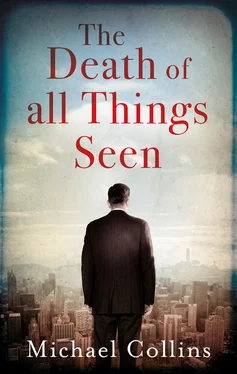Back home, Joanne smoked a joint and felt the slow release of tension, resigned that her fate was being decided elsewhere. Randolph came and licked her hand.
From the doorway, she watched Grace asleep in her bed. She could see, too, in the living room, the disconsolate tent set up over her heirloom table. The joke was long stale. Norman had been right about almost everything in her life. The heirloom table had not sold. In Norman’s office, she looked at the board of The New Existence . She was just glad she was on it.
*
Peter Coffey told a series of lies and some truths, not necessarily in any order, when Joanne called him. She had done a very bad thing for a nanny. She had left her charge alone, slipped out and rented a movie at the convenience store that made its trade in more illicit, pornographic movies, though, there was still the clawing nostalgia for faded cassettes like ET, Jaws, Poltergeist , and Close Encounters . She had seen the box sets on display on her walks with Grace.
She was gone a matter of minutes.
She stared at the cassette boxes. Youth still lived within these films. The great genius of Spielberg’s Poltergeist , reconstituting and making innocuously entertaining the genocide mass burial of Indians, rising in a California subdivision, when the Jewish holocaust must have been alive in Spielberg’s soul. There were histories allowed or disallowed, or that was not it exactly. It was not a matter of censor, but rather that there was great fortune to be made in the quiet distraction of a lesser, apolitical history, and those who understood it, they were the new historians of a sublimated and complicated history.
Joanne had some preamble in mind like that, something that might appeal to Peter. It was said in a rush of words. She didn’t even announce herself. She came up on his phone, her name. She was in his contacts still. He said that somewhere into the conversation. It augured a faint hope. She was not erased from his life.
She mentioned the convenience store specifically, for a frame of reference. They had rented movies, or Peter had sent her down for porn on the occasion when there were insults flung that she didn’t know what she was doing. It was a life of injury and sustainability, or it had proceeded along those needful lines. That was how she might yet describe it. At that moment, she would take it.
It was four in the afternoon when she called. Peter answered on the second ring. He was working, grading papers. A silence hung between them.
‘What is it like, Oklahoma?’ Joanne asked, when nothing else came to mind. She had heard they were called Sooners but never looked up its meaning.
Peter obliged. The Sooners were so-called because some jumped sooner than the official start time for the race to claim a part of the American heartland.
Joanne said innocently, ‘I suppose the others are called the Laters ?’
Peter turned a paper validating that he was indeed grading papers. Joanne heard the sound paper makes.
Snow was heavy and thick. Peter took up the conversation. There was longing and desperation in his voice. The snow was a far greater burden here, what with winds that blew unimpeded. Whiteouts and drifts were a way of life. Roads could disappear just like that and did. He clicked his finger.
Joanne closed her eyes. She could see it then, the vastness — the emptiness.
Peter explained how the Board of Regents was investigating an online program where nobody would ever have to show up. The most desolate places were often in the most need of the greatest advancements. If you were injured there, chances were you would be flown by helicopter to a regional facility, and your scans would be read by somebody in Oklahoma City or Tulsa, or, maybe, not even by an American, and not even read in America. The Great Plains was a great contradiction of patriotism and pragmatism. It was all monoculture and great machines, robotic harvesters controlled from satellites. They kept the rodeos alive for a sense of nostalgia, but most rode a mechanical bull in the bars on a Friday and Saturday night.
In simply speaking, Peter pushed an alternative reality on her. He didn’t say which was better. He did the majority of the talking. He didn’t say if he liked it or not. There was little to stop him talking.
He was, he intimated, living with the widow of a farmer who had died while riding atop a great combine harvester that had covered near twenty miles of planted wheat after he died.
The husband had been found a county over, in sheaths of wheat so high that they had to follow the trail left in his wake and work backward to discover where he most probably died, Peter pondering if, perhaps, God had simply forgotten George Farmer was dead. It was worth considering, God’s assumed culpability in being responsible for all living things. It seemed incomprehensible one being could bear such a burden. It was, Peter maintained, felt more fully in the vacuum of distances, in the great divide of time and land.
‘Farmer’ was the farmer’s name, which was suspicious and indicated there was less truth here than might have been initially granted. It seemed like such a desperate and incredulous overreach of any apparent legitimate story.
Joanne might have said this to Peter, but she didn’t. His life was not her life anymore. There was no mention of the graduate student with whom Peter had left, and there was solace in that fact alone. It was a marvel Peter had found somebody at all, if he even had, which she doubted, but then the world was truly a big place.
Peter set about reciting a poem he had written about the death of George Farmer. The poem, titled, ‘Silo…’ was spelled, ‘Sigh Low’. He was playing with some literary effect. It was a poem, not for the page, but to be read aloud, with a lot of alliteration and onomatopoeia, or some such literary inventiveness Joanne was not entirely sure she understood, but it kept Peter happy and content. It was what counted in the end.
They were talking over forty minutes, and nothing of substance had been said. Her ear had a slight ache. She said, in a vexing way, just to suddenly know, ‘This widow, does she have a name?’
The widow’s name was Jessie — Jessie Farmer. Peter elaborated. She was decidedly younger than her husband had been and marked by an indefatigable spirit of the early pioneers. She had left home at fifteen. He described her as a spirit akin to Annie Oakley.
Joanne sensed the imaginative reach of the desperate. She was turned to the TV, her mind already distracted in the cleaving awareness that they were done. None of it was true, but she had brooked a dam of emotion in Peter. It was her obligation to stand in the deluge of regret.
Poltergeist was on auto-replay, rolling through the credits, and had been for close on five minutes. It was a great wonder how a movie was ever made, how each found their calling. She meant to look up what exactly was a Key Grip or a Best Boy.
Peter was still talking about Jessie Farmer, how she had come from a long line of ancestors drawn by the Forty-Niner Gold Rush, and how she was sure there was whore in her some ways back. It was inevitable, men drunk on whiskey, men laid up in tubs of grimed water in advance of services rendered. It had been a quarrelsome business, those pioneer years, where there had been no long-term options and where each had survived by their wits and sense of fear and, in the West, how well they could handle a firearm. This was how the West was won and lost and won again. In his explanation there was a preternatural sense you could enter and understand another’s history better than your own. There was something good happening out in Oklahoma. Joanne believed it.
Joanne checked on Grace. She felt the far cast of men in her life at a great distance. She was alone but contained. Randolph roused. Joanne hushed him and went back into the long hallway. She was listening and not listening. There were, according to Peter, communities where Jessie came from out along the Pacific Northwest along the island chains, on Whidbey Island, who were preparing for the apocalypse and believed it was fast approaching.
Читать дальше












